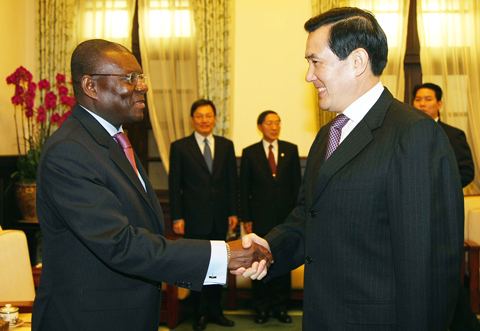President Ma Ying-jeou (馬英九) once again demonstrated his gift for the gaffe yesterday, raising a laugh during his welcome of the foreign minister of Sao Tome and Principe and his wife at the Presidential Office.
In his welcoming speech, Ma hailed Foreign Minister of Sao Tome and Principe Carlos Alberto Pires Tiny as coming from another of Taiwan’s West African allies, Burkina Faso. The blunder drew a round of laughter before Ma realized his mistake and corrected himself.
In a bid to avoid further embarrassment for the president, the Presidential Office asked the media not to report the faux pas. Presidential staffers later said that the laughter had not come from people inside the room, but from outside.

PHOTO: CNA
It was not the first time Ma has made a slip-up since he took office in May last year. In August, Ma got the name of a former Japanese governor wrong on two different occasions. In November, the president said during a TV interview that the NT$3,600 consumer vouchers that were issued to the public were worth NT$36,000.
In January, Ma referred to Chinese President Hu Jintao (胡錦濤) as “Hu Yaobang (胡耀邦),” a former Chinese Communist Party secretary-general. When attending the funeral ceremony of a Buddhist monk last month, Ma referred to the deceased by two different names, neither of which was correct.
At a separate event yesterday, Ma praised the enactment of the Taiwan Relations Act (TRA), saying it had contributed to peace in the Taiwan Strait in the 30 years since its enactment.
Ma said he has made efforts to improve relations with China since he took office, and added that his efforts had paid off, as the first signs of peace have appeared in the Taiwan Strait.
“It has a lot to do with the [US’] Taiwan Relations Act and the US government’s dutiful implementation of the law,” he said. “The relationship between Taiwan and the US will not erode, but only strengthen.”
Ma made the remarks while meeting a delegation of US parliamentarians led by Florida Congressman Lincoln Diaz-Balart at the Presidential Office yesterday.
Describing Washington as an “important ally,” Ma said he was pleased to see the US government and its people maintain economic, cultural and other non-diplomatic ties with Taiwan.
He also thanked the administration of former US president George W. Bush for notifying Congress to approve Taiwan’s arms procurement package, saying the purchase was important to the country’s safety and that Washington was obligated to sell defensive weapons to Taiwan based on the TRA.
In the 11 months since he took office, Ma said, the country had restored mutual trust with the US and both Taipei and Washington have made significant efforts to resolve problems.

An essay competition jointly organized by a local writing society and a publisher affiliated with the Chinese Communist Party (CCP) might have contravened the Act Governing Relations Between the People of the Taiwan Area and the Mainland Area (臺灣地區與大陸地區人民關係條例), the Mainland Affairs Council (MAC) said on Thursday. “In this case, the partner organization is clearly an agency under the CCP’s Fujian Provincial Committee,” MAC Deputy Minister and spokesperson Liang Wen-chieh (梁文傑) said at a news briefing in Taipei. “It also involves bringing Taiwanese students to China with all-expenses-paid arrangements to attend award ceremonies and camps,” Liang said. Those two “characteristics” are typically sufficient

A magnitude 5.9 earthquake that struck about 33km off the coast of Hualien City was the "main shock" in a series of quakes in the area, with aftershocks expected over the next three days, the Central Weather Administration (CWA) said yesterday. Prior to the magnitude 5.9 quake shaking most of Taiwan at 6:53pm yesterday, six other earthquakes stronger than a magnitude of 4, starting with a magnitude 5.5 quake at 6:09pm, occurred in the area. CWA Seismological Center Director Wu Chien-fu (吳健富) confirmed that the quakes were all part of the same series and that the magnitude 5.5 temblor was

The brilliant blue waters, thick foliage and bucolic atmosphere on this seemingly idyllic archipelago deep in the Pacific Ocean belie the key role it now plays in a titanic geopolitical struggle. Palau is again on the front line as China, and the US and its allies prepare their forces in an intensifying contest for control over the Asia-Pacific region. The democratic nation of just 17,000 people hosts US-controlled airstrips and soon-to-be-completed radar installations that the US military describes as “critical” to monitoring vast swathes of water and airspace. It is also a key piece of the second island chain, a string of

The Central Weather Administration has issued a heat alert for southeastern Taiwan, warning of temperatures as high as 36°C today, while alerting some coastal areas of strong winds later in the day. Kaohsiung’s Neimen District (內門) and Pingtung County’s Neipu Township (內埔) are under an orange heat alert, which warns of temperatures as high as 36°C for three consecutive days, the CWA said, citing southwest winds. The heat would also extend to Tainan’s Nansi (楠西) and Yujing (玉井) districts, as well as Pingtung’s Gaoshu (高樹), Yanpu (鹽埔) and Majia (瑪家) townships, it said, forecasting highs of up to 36°C in those areas